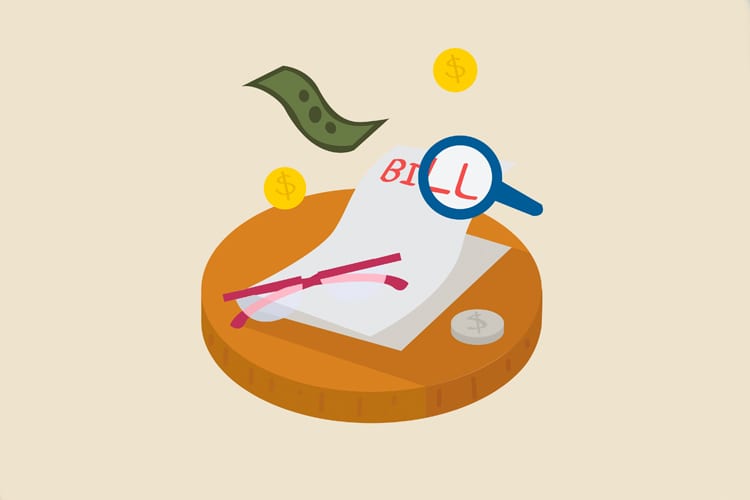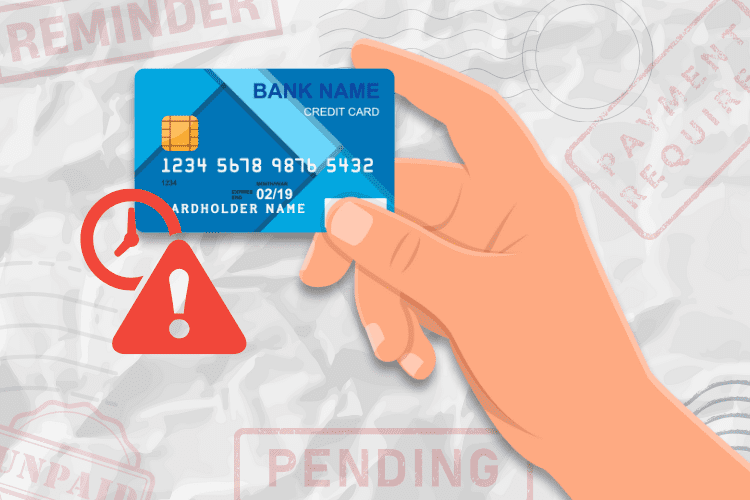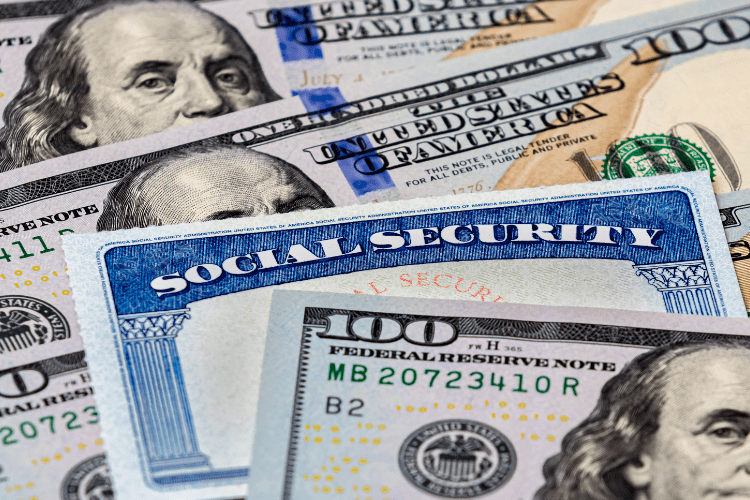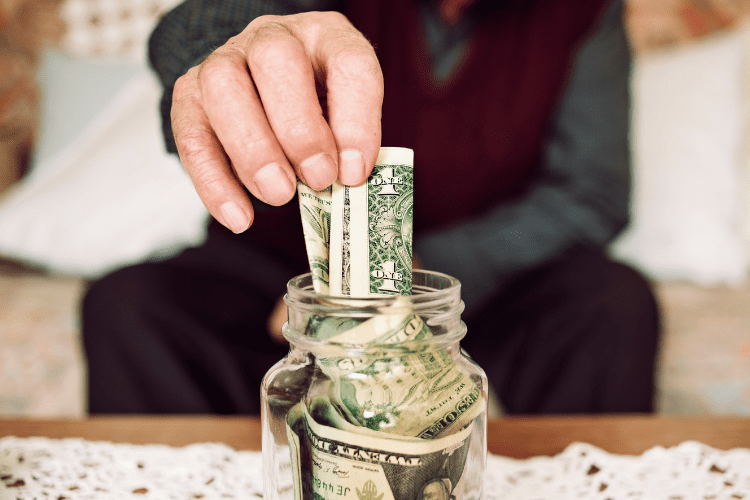How to Save During a Recession

Opting for thrifty lifestyle choices and creating an emergency fund (if you haven’t yet) can help prepare you for a recession.
It’s normal to feel anxious when a recession is looming and the stock market takes a dip — especially if you worry about having enough money to get by.
If you’ve been keeping up with saving and sticking to a budget, your financial habits may not shift too much. However, if you struggle in this area, it might be time to start reviewing your spending habits.
Having an emergency fund of 3 to 6 month’s worth of living expenses is one of the best ways to prepare for an economic downturn, but if you haven’t been saving, there’s still time to recession-proof your finances.
What happens during a recession?
During a recession, the economy is in a period of retraction. The National Bureau of Economic Research declares a recession after two quarters of negative growth.
During this time, unemployment will rise, interest rates will drop, and the overall production of goods and services will shrink. When interest rates drop, it makes loans less expensive to encourage consumer spending.
“The cost of everyday items rise during a recession, so even if you are lucky enough to still have a job, your wages won’t buy as much as they used to,” says Linda Jacob, an accredited financial counselor, and director of education at Consumer Credit of Des Moines.
While no one can predict exactly when the next recession will happen, historically, they occur on average every six to 10 years. Previous recessions have lasted from six months to more than three years, according to the NBER.
The personal impact of a recession
One of the biggest ways a recession can impact your finances is job loss.
“During recessions, people lose their jobs, or their income goes down tremendously, so their ability to pay for their housing and car get hit directly,” says Matt Goren, Ph.D. assistant professor of financial planning at the American College of Financial Services.
This is why having an emergency fund is important. Having emergency savings can give you peace of mind with your personal finances and help avoid unnecessary high-interest debt. However, if you haven’t been able to save money, there are still some steps you can take to mitigate the impact of a recession on your wallet.
Cut spending and establish an emergency fund
Depending on your financial situation and the recession’s impact on your personal finances, it may be too challenging to save for the recommended 3 to 6 months of living expenses many financial advisors recommend. At the minimum, shoot for at least one month of living expenses in a traditional savings account or high-yield savings account.
“Once a recession hits, losing your job or having the fear of losing your job, should catapult you into a pared-down budget with an even higher focus on saving,” Jacob says.
To help you prepare, start eliminating expenses, and put the money you were able to recapture into your emergency savings.
“It’s not fun or ideal, but if a recession hits and you lose your job, these things can really work,” says Tim Michaelis, Ph.D., assistant professor of entrepreneurship at Northern Illinois University College of Business.
Here are a few ideas of how you can trim expenses:
Learn a new skill
Becoming self-sufficient and developing skills for everyday needs such as cutting your own grass, cutting your own hair, and cooking all your meals at home can also be opportunities for savings.
Cut down on extras
Cutting luxuries in the entertainment category, such as streaming services and cable, can help if you’re new to saving. If you’re truly strapped for cash, it may not be enough. Discretionary spending isn’t typically anyone’s largest expense.
Wrangle in fixed expenses, if possible
Non-discretionary spending often takes up a bigger portion of a household’s budget. For one-in-four renters, housing takes up more than 50% of their incomes, according to the Joint Center for Housing Studies at Harvard University. Financial advisors typically suggest housing costs shouldn’t exceed more than 30% of your household income.
Tackling fixed expenses such as housing, your car, and food can alleviate your budget even more. While a $50 coffee habit is still an opportunity to save, opting for an apartment that is $200 cheaper a month or living with a roommate to split the cost of rent can add up to more savings.
“Looking to cut down on fixed expenses like housing and opting to move to a cheaper place can be transformative because it’ll have a much bigger impact on your budget,” Goren says.
Find other sources of income
When your expenses exceed your income, you’re unable to save every month. If your expenses are already down to the barebones, it may be time to create another stream of income.
Having another part-time job can also be a safety net in case you face a recession-related job loss. Outside of decreasing monthly expenses, a side job can help you earn extra cash for your emergency savings or go towards eliminating debt.
Strategize debt pay off
Even in a recession, it’s important to continue paying off your debt.
“Not paying your debt has lasting negative effects on your purchasing power in the future,” Jacob says. While the recession may only last a few years, bad credit can stay on your credit report for even longer. Bankruptcy can hang around on your credit report for up to a decade.
If you’re overwhelmed with credit card debt, a nonprofit credit counseling agency can help you create a plan to manage your debt and rebuild your credit score. You can also reach out to your lenders and ask about COVID-19 pandemic relief programs if you’ve lost your job and you’re in a financial bind.
“Be proactive and make that awkward phone call and get your payments deferred,” Goren says.
Because interest rates are low during a recession, you may be able to refinance your debt. This will give you more time to repay what you owe and lower your monthly payments.
“Your monthly payments will go down and the money you save can be channeled into an emergency fund, “Goren says.
The Bottom Line
Ideally, you’ve already saved money just in case a recession hits, which gives you more flexibility in your finances. But if you haven’t, implementing cost-cutting measures to become a savvy saver can benefit you when the economy picks up again.
Source bios
Tim Michaelis, Ph.D., is an assistant professor of entrepreneurship at Northern Illinois University College of Business. He focuses primarily on developing original research around the topics of resourcefulness and the efficient (i.e., frugal) use of resources in entrepreneurial ventures. Overall, this work is to help increase the survival rates and performance of startups and corporate spinoffs. Tim’s research has been published in the Journal of Business Venturing, Journal of Business Venturing Insights, Journal of Technology Transfer, and Academy of Management Discoveries, among others.
Linda Jacob is a certified financial planner and an accredited financial counselor. She currently works for nonprofit Consumer Credit of Des Moines as a financial counselor and the director of education. She is the author of “No More Paycheck to Paycheck – Stop Living in Debt and Start Living the Dream,” and is a member of the Financial Planning Association and the Association for Financial Counseling, Planning and Education.
Matt J. Goren, Ph.D., is an acclaimed teacher and speaker who focuses on the interplay of personal finance and psychology. He is an assistant professor of financial planning at The American College of Financial Services, joining the college in July 2018 after serving as a professor in the financial planning program at the University of Georgia. His personal finance radio show and podcast, “Nothing Funny About Money,” was named 2018’s most outstanding consumer financial information resource by the Association of Financial Counseling and Planning Education. Through his work, he has created and expanded financial literacy programs that now help thousands of students – from children to seniors. In 2017, his team at the University of Georgia’s ASPIRE Clinic was named Pro Bono Advisors of the Year by Financial Planning Magazine.










